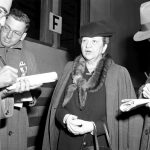EDITORIAL: A trailblazer brought back into the spotlight

The fire at the Triangle Shirtwaist Factory in New York on March 25, 1911, still stands as one of the most devastating workplace tragedies in United States history.
When the blaze broke out on the eighth floor of the factory late in the afternoon on that Saturday, scores of workers – mostly girls and women who were mostly recent immigrants – were trapped because doors and stairwells were locked in order to prevent theft and unauthorized breaks. The 146 people who perished died horrific deaths from the flames that consumed the building, from smoke inhalation or by jumping out of windows in sheer desperation.
One of the witnesses to this nightmare was Frances Perkins, a 30-year-old New England native and recent graduate of Columbia University with master’s degrees in economics and sociology. Already a dedicated and thoughtful reformer, watching the Triangle Shirtwaist Factory fire unfold drove Perkins to even greater levels of activism, which culminated in her being named secretary of labor following the election of President Franklin Roosevelt in 1932.
Perkins is not a familiar figure to most Americans today. When we think of the New Deal and the federal government’s efforts to dig America out of the hole caused by the Great Depression, we think of Roosevelt and his Hudson Valley accent lifting spirits through his fireside chats and his exhortation that we had “nothing to fear but fear itself.” But Perkins was instrumental in the creation of some of the pillars of the New Deal and protections that we now take for granted – unemployment benefits when we are thrown out of work through no fault of our own, regulations on child labor, laws setting minimum wages and overtime pay, and Social Security, which has allowed elderly Americans to escape poverty in their old age.
Perkins was also the first female Cabinet secretary and had to overcome skepticism that, yes, a woman could serve at the highest levels of government just a little more than a decade after women won the right to vote.
America was reminded about Perkins’ life and accomplishments this past week, when her homestead in Maine became the Frances Perkins National Monument, the country’s 433rd national park site. Historian Heather Cox Richardson stated that Perkins, who died in 1965, worked to “protect the communities of people who lived in the nation. She recognized that children, the elderly, women, disabled Americans, all of whom contributed to society whether their contribution was recognized with a paycheck, were as valuable to the survival of a community as male workers and the wealthy who employed them.”
Several quotes from Perkins are featured on the Social Security website. This one in particular stands out: “Our idea of what constitutes social good has advanced with the procession of the ages, from those desperate times when just to keep body and soul together was an achievement, to the great present when “good” includes an agreeable, stable civilization accessible to all, the opportunity of each to develop his particular genius and the privilege of mutual usefulness.”
There are a number of books that have been written about Perkins, and Perkins herself wrote a couple of memoirs, including one on Roosevelt that was reprinted as recently as 2011. With any luck, the honor that was accorded to Perkins this week will ignite Americans’ curiosity about her and lead them to seek these volumes out.

